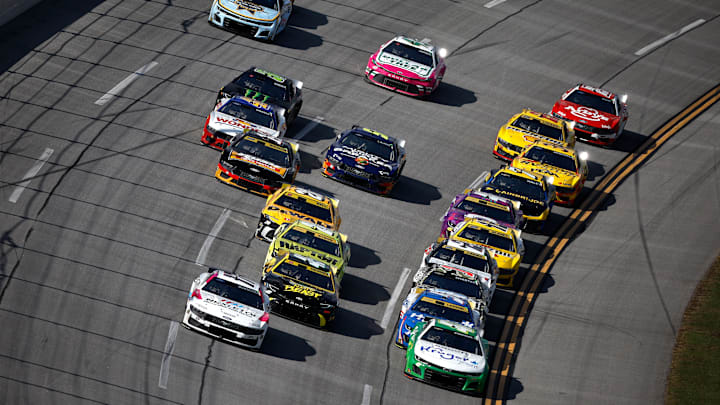JTG Daugherty Racing's Ricky Stenhouse Jr. scored his first NASCAR Cup Series win since the 2023 Daytona 500 in Sunday afternoon's playoff race at Talladega Superspeedway, even though he did not qualify for this year's postseason.
Stenhouse is the third different non-playoff driver to find victory lane through the first five races of the four-round, 10-race postseason, and he is the 18th different winner of the 2024 season. RFK Racing's Chris Buescher won the round of 16 race at Watkins Glen International, and Trackhouse Racing Team's Ross Chastain won the round of 12 opener at Kansas Speedway.
The modern playoff format was introduced in 2014 as a "win and in" format, with 16 spots open and regular season wins automatically catapulting drivers into the playoff picture, irrespective of their points position.
For example, Wood Brothers Racing's Harrison Burton finished in 34th place, last among full-time drivers, in this year's regular season standings, but he made it into the playoffs thanks to his win at Daytona International Speedway.
But it's not really a "win and in" format.
The 16 playoff spots officially go to the regular season champion, whether he wins a race or not, and then the 15 drivers who rank next highest in wins. If there are more than 16 playoff eligible drivers/winners, the tiebreaker among drivers with a single win becomes points.
In 11 years of this modern format, there has never been a season in which there were more regular season winners than playoff spots. But the Next Gen era has demonstrated that that is far from a guarantee, and this year's postseason has highlighted that.
This year, there were 15 winners in 26 regular season races, though Richard Childress Racing's Austin Dillon had his Richmond Raceway victory encumbered and therefore did not get into the playoffs. So 14 playoff spots went to winners, and the other two went to the top two drivers on points.
But what if Stenhouse had won at Talladega in the regular season instead of 23XI Racing's Tyler Reddick, who would have gotten into the playoffs anyway?
What if Chastain had won at Kansas in the regular season instead of Hendrick Motorsports' Kyle Larson, who would have gotten into the playoffs anyway?
What if Buescher's road course win at Watkins Glen International had come at Circuit of the Americas or Sonoma Raceway? Hendrick Motorsports teammates William Byron and Larson won those races, respectively, and would have gotten in the playoffs anyway.
And what if Dillon's win at Richmond had counted toward his playoff eligibility?
The possibility of having more than 16 regular season winners is nowhere near as far-fetched as it once seemed.
Two of the first three seasons of the Next Gen car have now produced at least 18 different winners. The 2022 season saw 19 winners in the first 29 races, with new winners in each of the three races in the opening round of the playoffs, and this year, the tally is up to 18 in 31.
Twice in three years, more than half of the sport's full-time drivers have found victory lane well before the end of the season. Is 17 winners in 26 races really as "impossible" as it seems?
There have long been calls for adjustments to the playoff format, such as a performance clause that requires winners to be in a certain points position in order for their wins to count toward playoff eligibility. The removal of the former top 30 requirement has been questioned, never more so than when Burton won at Daytona in August.
But is it going to take a regular season with 18 or 19 winners – and perhaps multiple drivers in the top five in the point standings missing the playoffs – for an adjustment to be made?
We already saw fourth place Martin Truex Jr. miss the postseason in 2022, and had Kurt Busch not gotten injured and withdrawn from the playoffs, third place Ryan Blaney would have missed out as well. At what point do NASCAR's eyebrows start to be raised?
There is no argument to be made that the current format isn't fair. It's the same thing for everybody, and playoff spots – and wins – are earned, not deserved. Race wins are by no means easy to come by for anybody.
But perhaps an adjustment isn't as far away as many once believed if NASCAR find themselves in a situation where the regular season produces an absurd number of different winners, which seems like it's eventually bound to happen in this era of newfound Next Gen parity.
